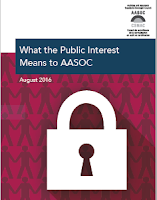The
accounting profession serves the “public interest” but what exactly does the
term mean? Canada’s Auditing
and Assurance Standards Oversight Council (AASOC) has
clarified how it defines the “public interest” in a newly-released paper. The
paper, “AASOC’s
Consideration of the Public Interest,” outlines who is the
public, what are the interests of the public and how the AASOC evaluates
whether an action, decision or policy is in the public interest.
To
provide a structure for the consideration of the “public,” a stakeholder
approach was adopted. Fostering trust,
economic growth and long-term financial stability are of immense importance to
the public at large. This makes the public at large, even those who do not
invest in capital markets, a stakeholder in our work. The broader public,
including those who do not invest in stocks and bonds of individual companies,
are also often stakeholders through investment funds, pension plans and as
taxpayers.
Present
and potential investors, financial institutions and other creditors of private
entities and public institutions, including government related bodies and
not-for-profit organizations, have a prominence as stakeholders in our
considerations. In short, those economic participants who entrust or consider
entrusting their money to an entity.
Additional
stakeholder groups that are integral to the functioning of audit and assurance
services in Canada, each with roles in serving and protecting the public
interest, include:
• audit committees and similar bodies or persons charged with
governance, including parliamentary committees;
• management and financial information preparers;
• providers of audit and
assurance services; and
• various financial regulators and inspectors.
The paper notes that, "Ultimately, the consideration of whether a particular activity is in the
public interest requires the exercise of professional judgment." The exercise of
professional judgment includes that we stand back from the full suite of
criteria (for example, transparency, public accountability, competence,
independence, due process and balancing of potential outcomes) to consider whether
the final result is in the public interest." Read
the AASOC paper to learn more about the interests
of the public and how the AASOC evaluates
whether an action, decision or policy is in the public interest.
